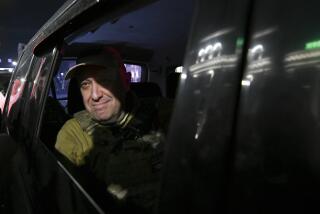This Could Be a Second Russian Revolution : Changes are coming fast and furious; the only certainty is uncertainty
- Share via
Something that can fairly be called a revolution is shaking the political foundations of the Soviet Union. Institutions that for 70 years and more have been the bulwark of Communist rule are being attacked and dismantled with astonishing swiftness. The Communist Party itself, distrusted and increasingly despised, has been declared virtually anathema, its organizations and activities suspended in the vast Russian republic, outlawed in Lithuania.
President Mikhail S. Gorbachev’s own political pertinence appears to grow more questionable by the day. Since his release from captivity on Wednesday he has had to share not just the limelight but crucial decisionmaking authority with Russian Federation President Boris Yeltsin. Gorbachev’s nominated replacements to head the military, the Interior Ministry and the KGB were within 24 hours themselves replaced, by men approved and possibly even chosen by Yeltsin. Gorbachev’s post-coup defense of the Communist Party’s leadership role and his reaffirmation of his unequivocal belief in socialism seem to call into question his judgment as well as his relevance to the Soviet Union’s future.
Gorbachev returned to Moscow after the putsch’s collapse promising that he would not conduct a witch-hunt against those who supported the effort to overthrow him, that proper legal processes would be pursued. Such apparent magnanimity would be unique in Soviet history. Yeltsin has other ideas. Believing that the political momentum is now all with the reformers and that the enemies of change are in retreat and disarray, he wants to strike vigorously to purge the organs of authority and redirect or even abolish their functions. He has already begun, in some instances assuming powers he has not been constitutionally granted. There are many who will be made uneasy by this apparent opportunistic willingness to ignore constituted legal procedures.
Three weeks ago Yeltsin ordered Communist Party cells to be booted out of state-owned factories and organizations on Russian territory. This week he ordered party cells in the army--membership in which was obligatory for officers’ promotions--to be disbanded. The party is similarly to lose its elevated status in the Interior Ministry, the police, the KGB. There is even talk of transforming the latter organization into a kind of benevolent association for the defense of civil liberties. Heaping insult on ignominy, the Moscow city council has cut off telephone service to KGB and Communist Party offices. At the same time Yeltsin has suspended a number of party newspapers in Russia and fired the heads of the Tass and Novosti press agencies.
These are only the earliest indications of an epochal power shift occurring in the aftermath of the failed coup. A key next step will be what happens to the new Union Treaty between Moscow and nine of the 15 republics that was supposed to have been signed this week. The treaty aims to hold together most of the country in a new federation, the Union of Soviet Sovereign Republics. The inducement is the devolution of more powers to the republics in such vital areas as control over finances and resources. Yeltsin now says he wants negotiations reopened, that the republics must be given more power, especially over taxation. The sudden and punishing blows directed at the party and secret police can only give impetus to the effort to redistribute power from the center to the republics.
The Gorbachev years have brought the Soviet Union, and the world, momentous and beneficial change. The avenues to greater change are open. Whatever becomes of Gorbachev himself--and it’s too soon to write his political obituary--an indeterminate period of continued flux and confusion surely lies ahead. The contest for power in the Soviet Union isn’t settled. The fidelity to democratic processes of those contending for it cannot be taken for granted. The revolution rolls on, a mighty and accelerating machine, demolishing the old but also creating dangerous new uncertainties.
More to Read
Sign up for Essential California
The most important California stories and recommendations in your inbox every morning.
You may occasionally receive promotional content from the Los Angeles Times.













